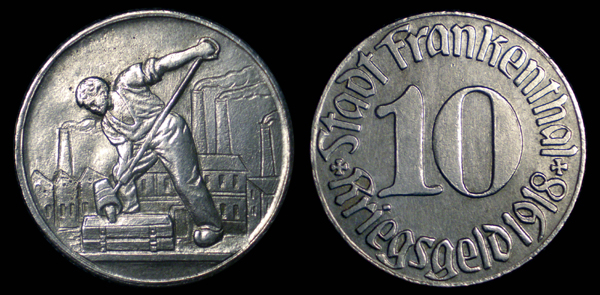
STADT FRANKENTHAL (GERMAN) 10 PFENNIG 1918
L- 130.11 City of Frankenthal (Rhineland-Palatinate) Iron 10 Pfennig Coin Depicting a Foundry Worker.
This iron coin is Kriegsgeld (war money) issued by the City of Frankenthal, it was meant to be used as small change. It depicts a woman working for the war effort carrying large cannon or mortar shells.
Frankenthal is a city located in the state of Rhineland-Palatinate in southwest Germany. It lies just northwest of Mannheim on the Isenach river, connected with the Rhine by a canal. Human settlement of the area dates to ancient times. It was first mentioned in 722 as Franconodal, a fishing settlement. It was the site of an Augustinian monastery from 1119 until it passed to the Palatinate in 1562 and was settled by Dutch Protestant refugees. It was chartered in 1577 by the elector John Casimir and by the 1600 it had been fortified.
In 1621 it was besieged by the Spanish during the Thirty Years' War. From 1623 until 1652, save for two years, it was occupied by the Spaniards. In 1688 it was stormed and burned to the ground by the French and the fortifications were razed. The towns fortunes suffered from prolonged conflict, occupation and eventual destruction, it would not recover for more than 50 years.
Frankenthal did recover and by 1750 industry came to the town as new factories were built. In 1755 the Frankenthal Porcelain Works was established and became famous for producing the finest porcelain surpassed only by the Meissen Porcelain Works in Saxony. In 1797 the town came under French occupation during the French Revolutionary Wars. It passed into the rule of Bavaria in 1816.
By 1860 Frankenthal began to experience rapid growth. As industrialization hit Frankenthal, both industry and population grew rapidly. By World War I the town was known for its Iron Foundries and the manufacture of heavy machinery among other industry. These industries were, like most others, drafted into the war effort.
Today Frankenthal is a traditional German city with a healthy industrial base. It is home to a monument and a museum dedicated to the veterans of the Napoleonic wars, a beautiful medieval inspired town hall, historic gates, and the remnants of the former protective walls.
